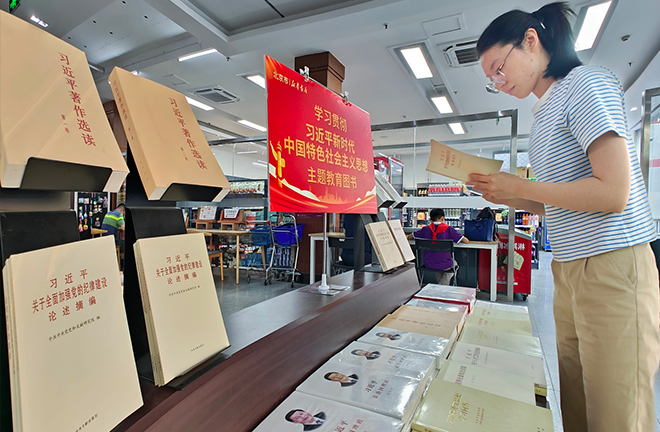Xi’s thought holds domestic and global significance

A reader peruses a book concerning Xi Jinping Thought on Socialism with Chinese Characteristics for a New Era at a Xinhua Bookstore outlet in Chaoyang District, Beijing, on June 3. Photo: Li Fang/CSST
Under the guidance of Chinese President Xi Jinping’s governance strategies, a series of pragmatic and efficient national policies have enhanced China’s openness to the world and increased global understanding of China. Benefiting from Xi’s guidance and leadership, China has made remarkable breakthroughs and landmark progress in many sectors, and achieved a modernization take-off that has proven difficult for many countries to attain. Peter Kagwanja, president and chief executive of the Africa Policy Institute in Kenya, recently discussed Xi Jinping Thought on Socialism with Chinese Characteristics for a New Era in an interview with CSST.
Guiding China’s development
According to Kagwanja, Xi’s thought, weaving China’s web of development in the new era, is the crystallization of wisdom that guides China and influences the world. It creatively adapts the basic tenets of Marxism to China’s unique context, opening up new thought frontiers under the banner of “Socialism with Chinese Characteristics.”
“Xi’s ideas are critical in not only guiding China’s development but also in enhancing its role in global governance,” Kagwanja remarked. China’s global leadership is more important today than ever before. China has become more and more influential with deeper connections with the world. Under Xi’s guidance, China has grown more confident in global diplomacy, playing the role of a responsible power in today’s international system.
China needs the world, and the world cannot ignore China. In an era where many Western powers are turning to populism and isolationism, China is offering a source of confidence amid a persistently bleak global economic landscape, Kagwanja asserted.
“President Xi has put on the world stage a style of informed leadership that plays a role in a deliberative process of crafting and implementing national policy. He has a calm, cautious, emotionally controlled, and conscientious personality. This makes him an effective leader, and enables him to naturally evoke trust at home and win respect across the international community, especially the developing countries,” Kagwanja added.
Kagwanja continued to say that Xi pays careful attention to details and values knowledge, blending visionary and technocratic traits to visualize new concepts and alternatives for governing China and the world. In his four-volume collection, Xi Jinping: The Governance of China, Xi’s “philosopher king” persona has enabled China to promote narratives of peace and prosperity for both itself and the world, contrasting with the doomsday narratives often depicted by right-wing scholars in the West, who portray global civilizations as being on the brink of war. The collection also highlights Xi’s people-centered approach to development, a signature aspect of his philosophy rooted in traditional Chinese ideas of harmony in society.
“What impresses me is how Xi has sustained the fight against corruption in all its guises and levels, and led China through far-reaching social, economic, and security reforms since the 18th CPC National Congress,” Kagwanja said. Inside China, Xi’s leadership has instilled discipline and optimized party structures, significantly stabilizing China’s political system and creating a favorable environment for economic development and social progress. He has also led the modernization of the Chinese military into a world-class praetorian guard of global peace.
Distinctive modernization paradigm
Commenting on Chinese modernization, Kagwanja stated: “The model of Chinese modernization offers a very different paradigm in sharp contrast to Western-style capitalist models. Unlike many countries that tended to pursue a Western path to modernization, the CPC charted a modernization path that is uniquely Chinese.”
According to Kagwanja, while emphasizing four forms of modernizations—stressing industry, agriculture, science and technology, and national defense, China continuously adjusts its modernization policies to align with changing national realities. This adaptive approach has enabled the Chinese to achieve significant progress in modernization in a short period, a feat that took the West centuries to accomplish.
“China’s economic progress has produced the world’s largest middle class. China was able to provide significant access to health, education, and other welfare services. Fueling China’s development is partly its expanding industrial sector, including manufacturing, construction, and mining. Xi’s leadership has also transformed China into a digital power in the age of the internet,” Kagwanja added.
Sobering vision for global future
Discussing the Belt and Road Initiative, the Global Development Initiative (GDI), the Global Security Initiative, and the Global Civilization Initiative proposed by China, Kagwanja noted that these initiatives vividly lay out its vision and foreign policy as a major power aiming to achieve global development, prosperity, security, and stability.
“Through the idea of the GDI, China casts its approach over a global scale to overcome the challenges posed by the COVID-19 pandemic and is actively supporting the timely achievement of the UN 2030 Agenda for Sustainable Development. China is assisting other developing countries in the Global South to improve infrastructure, hasten industrialization and manufacturing, reduce poverty, and boost agricultural progress. In Africa, China is funding infrastructure across regions, supporting the implementation of Agenda 2063 (the continent’s development blueprint), as well as the African Continental Free Trade Area,” Kagwanja said.
Today, the global surge of geopolitical conflicts, protectionism, and anti-globalization trends has eroded human solidarity, which is urgently needed to effectively forge common values in response to shared threats like epidemics, climate change, and the scourge of poverty. “Xi’s thought on equality of all civilizations, the role of globalization in realizing shared development, and a non-hegemonic approach to international affairs provide a sobering alternative vision to underpin sustainable peace, security, and shared prosperity for what he envisions as ‘community with a shared future for mankind,’” Kagwanja concluded.
Edited by CHEN MIRONG

 PRINT
PRINT CLOSE
CLOSE